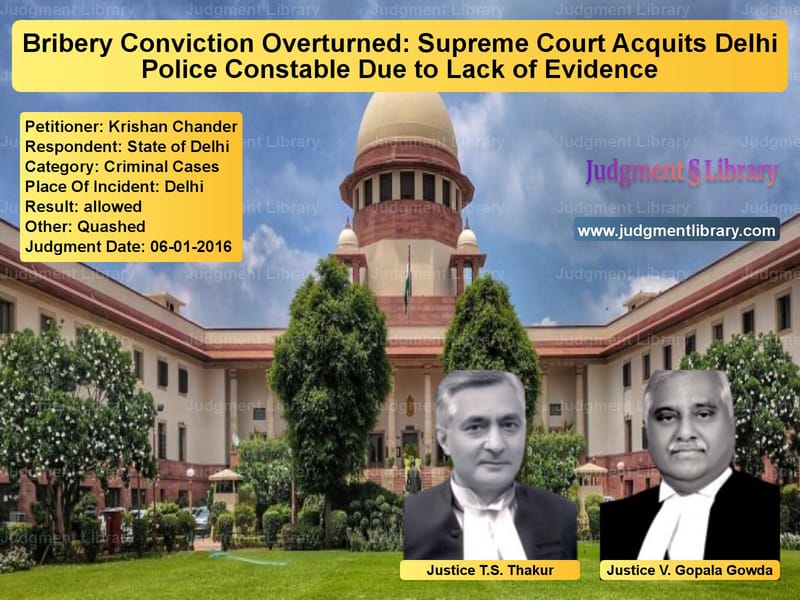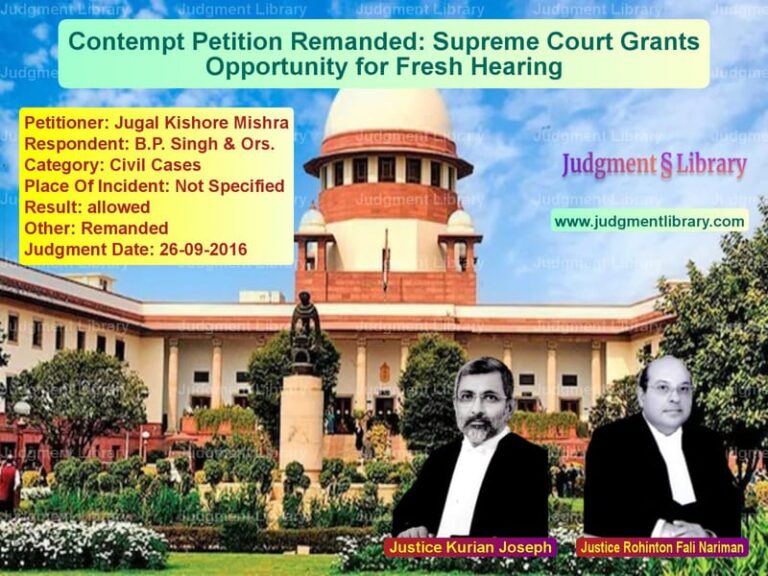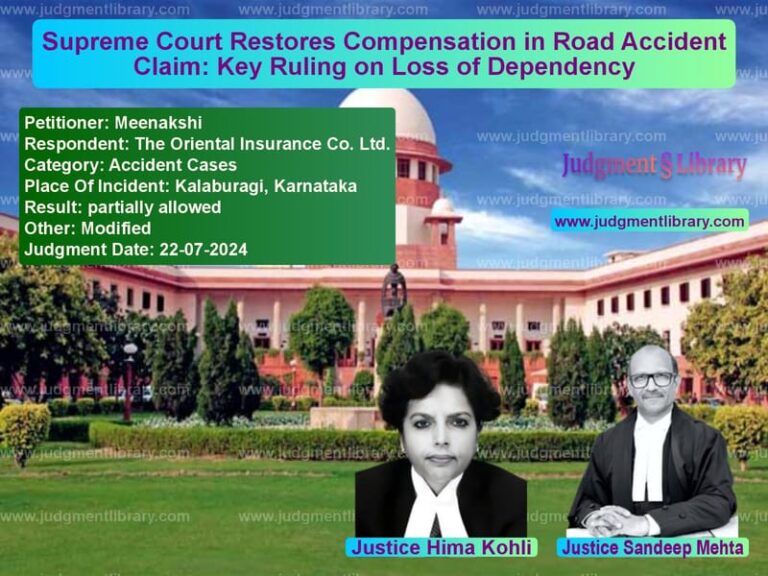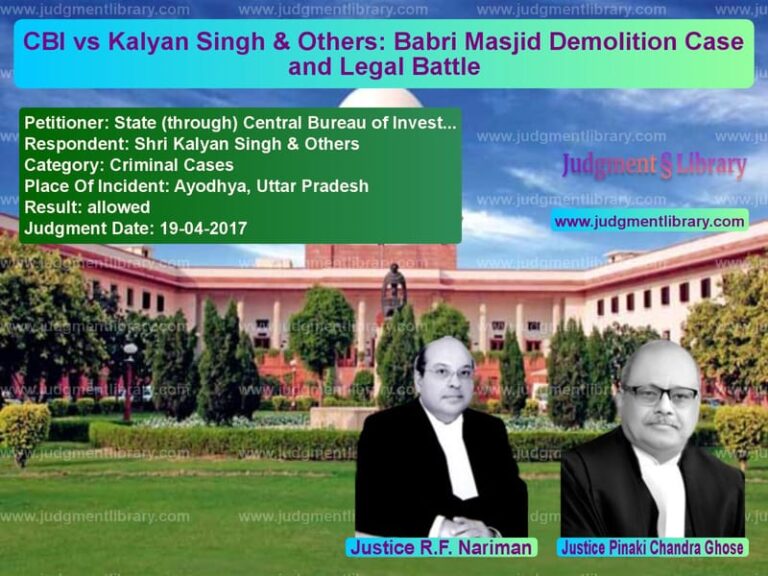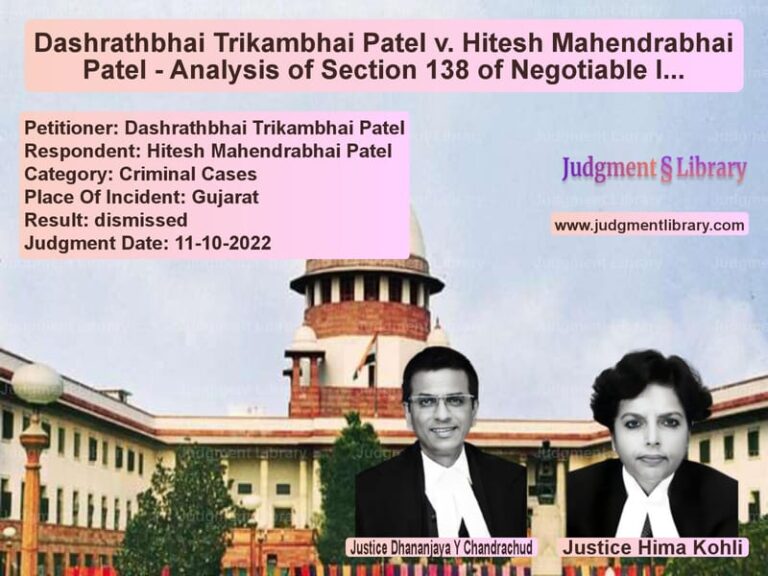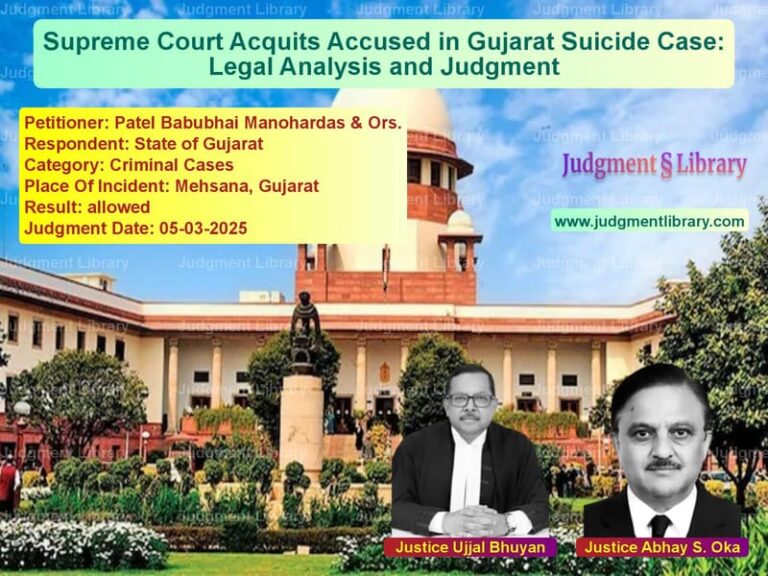Bribery Conviction Overturned: Supreme Court Acquits Delhi Police Constable Due to Lack of Evidence
The case of Krishan Chander v. State of Delhi marks an important ruling in corruption law, where the Supreme Court overturned the conviction of a Delhi Police constable accused of accepting a bribe. The judgment highlights the necessity of proving demand and acceptance of illegal gratification beyond a reasonable doubt in cases under the Prevention of Corruption Act, 1988. The ruling underscores the importance of procedural fairness and evidentiary requirements in bribery allegations.
Background of the Case
The case stems from an incident on July 29, 2004, when an FIR (No. 662 of 2004) was registered at Nangloi Police Station, Delhi, against Krishan Kumar, the brother of the complainant, Jai Bhagwan (PW-2). Krishan Kumar was arrested for offenses under Sections 279 and 337 IPC (rash driving and causing hurt by an act endangering life).
The complainant, Jai Bhagwan, approached Assistant Sub-Inspector Ranbir Singh (PW-11) for his brother’s release on bail. The investigating officer directed the appellant, Constable Krishan Chander, to release Krishan Kumar on bail.
According to the prosecution, the appellant allegedly demanded a bribe of Rs. 5,000 from Jai Bhagwan for releasing his brother. Under duress, the complainant allegedly paid Rs. 4,000 on July 29, 2004, and was asked to pay the remaining Rs. 1,000 on July 30, 2004, at Ditchau Kalan Bus Stand, Najafgarh.
Anti-Corruption Trap and Arrest
Feeling aggrieved, Jai Bhagwan approached the Anti-Corruption Branch (ACB) and lodged a written complaint. A trap was set up on July 30, 2004, with:
- Two Rs. 500 currency notes treated with phenolphthalein powder.
- A witness, Anoop Kumar Verma (PW-6), assigned to monitor the transaction.
- Inspector Sunder Dev (PW-12) leading the raiding party.
According to the prosecution, Jai Bhagwan handed over the marked notes to the appellant, who placed them in his left shirt pocket. Upon receiving a signal from the witness, the raiding team apprehended the appellant. The police allegedly found the bribe money on the ground, and chemical tests showed traces of phenolphthalein on his hands and shirt pocket.
Trial Court Proceedings
The Special Judge, Delhi, convicted the appellant under Sections 7 and 13(1)(d) read with Section 13(2) of the Prevention of Corruption Act. The judgment, dated July 14, 2008, sentenced him to:
- Two years of rigorous imprisonment under Section 7.
- Two years of rigorous imprisonment under Section 13(2).
- Rs. 5,000 fine for each offense.
The sentences were ordered to run concurrently.
High Court Appeal
The appellant challenged the conviction in the Delhi High Court. However, the court upheld the Special Judge’s decision on November 7, 2014, ruling that:
- The presence of tainted money and positive chemical tests supported the prosecution.
- The testimony of independent witnesses confirmed that the bribe was accepted.
Appeal Before the Supreme Court
The appellant took the matter to the Supreme Court, arguing that:
- The prosecution failed to prove demand of bribe, which is a sine qua non for conviction.
- The complainant, Jai Bhagwan, turned hostile and denied that the appellant demanded or accepted any bribe.
- The money was found on the ground, not in his possession.
Supreme Court’s Analysis and Judgment
1. Demand of Bribe is Essential
The Court reiterated:
“The demand for the bribe money is sine qua non to convict the accused under Sections 7 and 13(1)(d) of the PC Act. Mere possession or recovery of currency notes is not sufficient.”
The Court cited B. Jayaraj v. State of Andhra Pradesh (2014), stating:
“Mere recovery of currency notes cannot constitute an offense unless it is proved beyond doubt that the accused voluntarily accepted the money knowing it to be a bribe.”
2. Complainant Turned Hostile
Jai Bhagwan, the complainant, stated in his testimony:
“One police officer in civil uniform (Ranbir Singh, ASI) asked me to spend Rs. 5,000 for my brother’s bail. Under duress, I gave Rs. 4,000 to him, not to the accused.”
Since the key witness did not support the case, the Court ruled:
“When a prosecution witness turns hostile on the demand and acceptance of bribe, the entire case falls apart.”
3. Lack of Direct Evidence
The prosecution relied on Anoop Kumar Verma (PW-6), but he could not confirm that the appellant demanded or accepted the money. The Supreme Court ruled:
“Without clear proof of demand, conviction under the Prevention of Corruption Act cannot be sustained.”
Final Judgment
The Supreme Court set aside the conviction and ordered the immediate release of the appellant. The ruling emphasized:
- No bribery conviction can stand without clear evidence of demand.
- Hostile witnesses weaken the prosecution’s case.
- Mere recovery of money is not enough for conviction.
Key Takeaways
- The demand for a bribe is essential for a conviction under the Prevention of Corruption Act.
- Hostile witnesses can undermine the prosecution’s case.
- Mere recovery of money does not automatically prove guilt.
- The burden of proof lies on the prosecution to establish demand and acceptance of a bribe beyond doubt.
Conclusion
The judgment in Krishan Chander v. State of Delhi highlights the stringent requirements for convicting public officials under the Prevention of Corruption Act. By emphasizing the necessity of proving demand beyond doubt, the Supreme Court reinforced the principle that convictions cannot be based solely on circumstantial evidence or hostile testimonies.
Don’t miss out on the full details! Download the complete judgment in PDF format below and gain valuable insights instantly!
Download Judgment: Krishan Chander vs State of Delhi Supreme Court of India Judgment Dated 06-01-2016.pdf
Direct Downlaod Judgment: Direct downlaod this Judgment
See all petitions in Fraud and Forgery
See all petitions in Money Laundering Cases
See all petitions in Judgment by T.S. Thakur
See all petitions in Judgment by V. Gopala Gowda
See all petitions in allowed
See all petitions in Quashed
See all petitions in supreme court of India judgments January 2016
See all petitions in 2016 judgments
See all posts in Criminal Cases Category
See all allowed petitions in Criminal Cases Category
See all Dismissed petitions in Criminal Cases Category
See all partially allowed petitions in Criminal Cases Category

